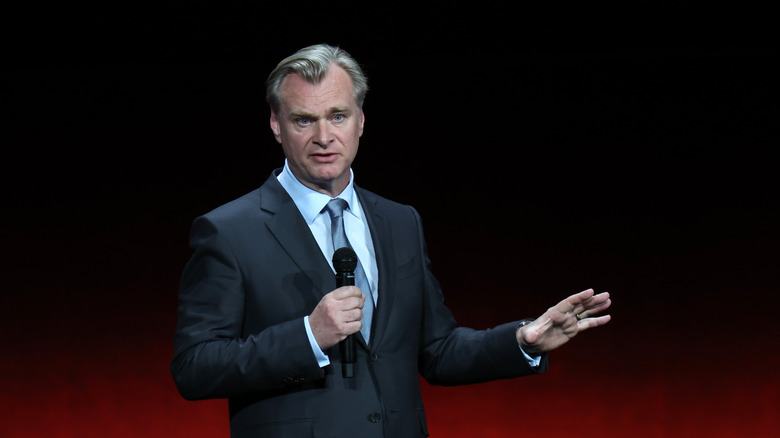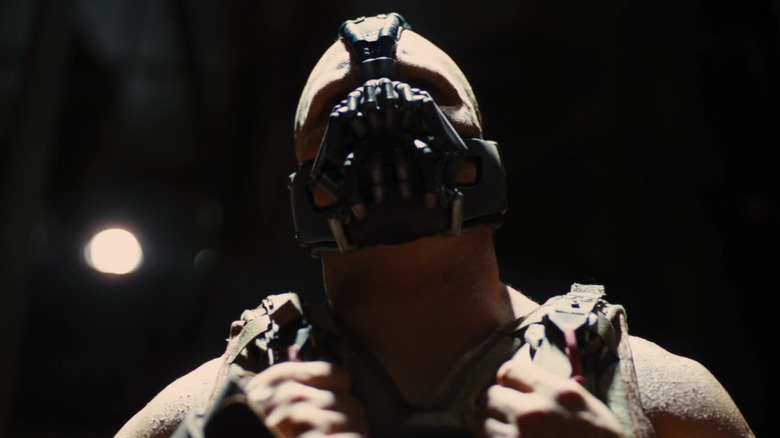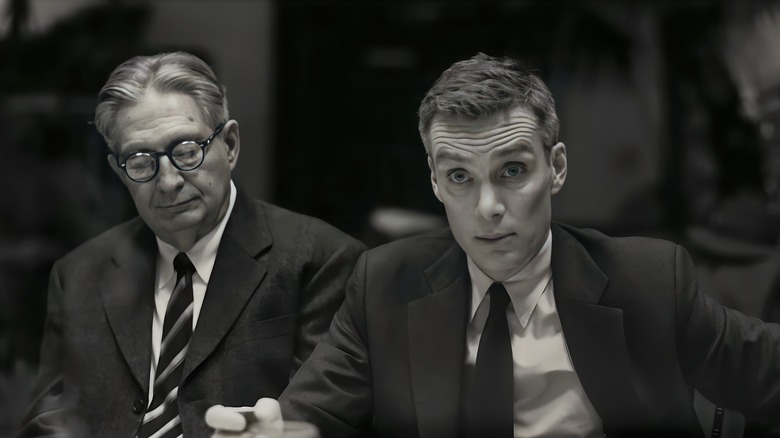Every Christopher Nolan Movie Has The Exact Same Problem - But Will Oppenheimer?
With a slate of mind-bending films, Christopher Nolan has firmly established himself as one of the definitive auteur filmmakers of our time. His films have often questioned the nature of reality itself, from cult classic "The Prestige" to "Inception." When hired by Warner Bros. to reboot Batman, Nolan did the unthinkable yet again, embarking on a trilogy of movies that made superhero media not only relevant, but respected — well before the MCU had made a dent in the zeitgeist.
With his new film, "Oppenheimer," Nolan now chronicles the life and times of its namesake, Robert Oppenheimer, the progenitor of the nuclear bomb. Trailers promise sound and fury aplenty, a spectacle that may steal the summer box office if it can fend off competition from Greta Gerwig's "Barbie." But no film is perfect, and Nolan's filmography – amid many repeating tropes — is dogged by a persistent problem that weighs down even his best movies and makes others entirely unwatchable. It's not his frenetic editing or muddled fight scenes, though they surely do his work no favors. Rather, it's the fact that film is an audiovisual medium ... and it's the first half of that equation, the audio, where Nolan consistently falters.
From film to film, Nolan consistently gets audio mixing unbearably out of alignment, even if just for a few pivotal scenes. Dialogue is drowned out by the score, or by atmospherics. Everyone leaves the theater confused, then gets told by Nolan's fans that they simply aren't smart enough to understand the movie. The problem has grown further out of hand with each of Nolan's films, culminating with 2020's "Tenet." And now, with trailers for "Oppenheimer" teasing a sound design the director hopes will convey the shock and awe of a nuclear explosion, will his new movie finally buck this disastrous trend?
Nolan's sound mixing is a choice, but a bad one
First, let's acknowledge that Nolan's sound mixing is a deliberate choice, however misguided. In 2014, after complaints about the sound mixing in "Interstellar" (which, it should be noted, is far and away the best sounding of his films), Nolan told The Hollywood Reporter, "There are particular moments where I decided to use dialogue as a sound effect, so sometimes it's mixed slightly underneath the other sound effects or in the other sound effects to emphasize how loud the surrounding noise is." In other words, Nolan wants you to be overwhelmed by his soundscapes, even if it means you can't hear the dialogue.
The problem with that approach is that, to use academic terminology, it sucks. Dialogue is an essential component of film, and audiences are trained to pay attention to it above all else. We may feel the score and hear the sound of explosions or gunfire, but we actively listen for language. Drowning out the dialogue gives us the sense we're missing something important, making it impossible to focus on anything else.
Had Nolan tried his vibes-based approach to sound mixing for one or two movies, recognized the issue, and moved on, it would have been an odd detour in an otherwise stellar career. But by now, it's clear that the director thinks audiences are the problem, not him. "Broadly speaking," he said in the same interview, "there is no question when you mix a film in an unconventional way as ["Interstellar"], you're bound to catch some people off guard, but hopefully people can appreciate the experience for what it's intended to be."
If the experience is intended to be tinnitus, mission accomplished.
Nolan's film snob attitude dooms his movies to sonic chaos
Since Christopher Nolan's career began, the sound problems have only worsened. Early films like "Memento" have only a few spotty audio issues. Later, with "Inception," atmospheric noise often drowns out the soundtrack, but voices are understandable most of the time, assuming you see it in a theater, or with a good home audio system. But by the time we get to "Tenet," everything sounds like it's being played from a pair of blown out car speakers. Good luck understanding anything without subtitles.
The problem can be traced back to Nolan's attitude toward filmmaking, which crystallized during the making of the "Batman" trilogy when the director first began to shoot with IMAX cameras. IMAX auditoriums have highly upgraded sound compared to standard ones. In 2017, Nolan told IndieWire, "We made the decision a couple of films ago that we weren't going to mix films for substandard theaters." For him, that means any theater without an IMAX auditorium, the format he has used to shoot every film since "The Dark Knight."
We could add a paragraph here about the "Batman" trilogy, but just go watch the airplane sequence with Bane (Tom Hardy) in "The Dark Knight Rises." Or the scene where the football stadium explodes. Or any action scene in any of the three films where someone talks during a fight. "Batman Begins" is the least offensive in this regard since it preceded Nolan's marriage to the IMAX format, but try understanding anything Scarecrow (Cillian Murphy) says under his mask. Okay, it looks like that paragraph ended up materializing.
The "Batman" trilogy is less muddled in the sound department than most other Nolan movies. We can only speculate whether the studio, known to be protective of its IP, did damage control.
Interstellar proves that Nolan does understand how to craft stellar acoustics
Here's a plot twist. Perhaps it's because this writer watched every single Christopher Nolan movie in rapid succession, or perhaps because they were viewed with studio grade audio monitors, but the complaints about sound in "Interstellar" were, frankly, misplaced. Among the audio mixes in Christopher Nolan's movies, "Interstellar" is the exception that proves the rule. It is a master class demonstrating that audio is just as important as visuals to audiovisual storytelling. Moreover, its audio mix accomplishes Nolan's goal of making the movie "experiential." Its haunting score feels like the empty cold nothing of the cosmos, and the dust storms tearing across the decaying future Earth on which it is set mirror that bleakness, telling us that there may be nothing out there, but there's nothing left down here, either.
Rarely during the film's nearly three-hour runtime is a sound out of place. More often, mixing is used to drive home its central themes. About halfway through the movie, Coop (Matthew McConaughey) watches video messages transmitted by his children. As his oldest son, Tom (Casey Affleck) says he's letting go of the notion that Coop will return, the score soars to new heights, then cuts off abruptly along with the message. The effect is like opening an airlock in space, replacing heartfelt emotion with empty despair.
The expert hand on the sound of "Interstellar" proves beyond doubt that Christopher Nolan knows how to calibrate the audio elements of a film, which makes the blown out, muffled sound found across his other movies even more baffling. If anything, the problem has grown worse since "Interstellar," a truly baffling regression.
Tenet has a tenuous relationship with tone
The elephant in the room when it comes to sound design in Christopher Nolan's filmography is, of course, "Tenet." For all the commotion the director made about ensuring the film saw a theatrical release — despite the concerns of public health during the peak of the COVID-19 pandemic — the movie didn't click with audiences, and the poor sound mixing was a large reason for that disconnect. Large sections of the film, including scenes that deliver pivotal plot information, sound like they're being played from a 1999 Jeep Wrangler. While some of the atmospheric elements in "Inception" drown out dialogue, that issue is magnified to extremes for "Tenet." Helicopters, cars, boats, explosions, and even wind noise drown out almost every word not spoken indoors.
A lot of criticism has been leveled against the plot of "Tenet," with many viewers claiming the movie makes no sense. But like every supposedly complicated Nolan movie, the narrative is quite simple. The problem is that much of the information necessary to understand it is entirely inaudible. To be clear, there is not a good movie buried underneath the sonic chaos of "Tenet," but there is an understandable one. After the majestic soundscapes of "Interstellar," how is it that Nolan's ability to coherently mix sound regressed to such amateurish levels? Not to pile on here, but there are TikTok stars who, despite working with nothing but a smartphone, have a better grasp of audio mixing.
"Tenet," along with the rest of Nolan's catalog, are in the past. But along with statements made by Nolan and his collaborators, they may tell us what to expect from the sound of "Oppenheimer."
Will Oppenheimer blow out our eardrums?
Looking across Christopher Nolan's filmography, a few things are clear. First, he understands sound in a much different way than most filmmakers. Second, he refuses to be proven wrong in that understanding. Third, and perhaps most importantly, he's not concerned about how his movies sound outside of an IMAX (or perhaps Dolby) theater.
What that means for "Oppenheimer" is that, to get the most out of it, you'll want to see it in a high-fidelity format. Nolan once again shot the movie in IMAX, saying in a video from the IMAX YouTube channel, "IMAX, for me, is a portal into a level of immersion that you can't get from other formats." Cillian Murphy, the film's lead, also appears in the clip, saying, "Chris makes films for theaters, for moviegoing audiences, and the best, most immersive version of that is IMAX." In other words, watch it at home and you may feel shortchanged.
However, while Nolan isn't the sort of man to publicly admit fault in his work, we'll have to experience "Oppenheimer" ourselves to know whether he's changed anything behind the scenes. After the box office flop and public reaction to "Tenet," stubbornness would be ill-advised, and certainly Nolan is aware of the stakes this time around. The movie will either deliver the sort of dynamic sound Nolan has always reached for, or it will detonate our eardrums with the force of a nuclear explosion.





